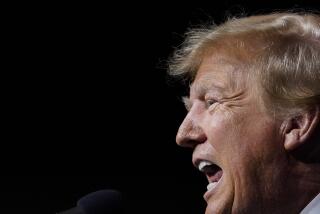THE SLINGS AND ARROWS OF OUTRAGEOUS CHARGES : Casting a Wide Net of Accusations
- Share via
WASHINGTON — They’d better tell us, fast. If the Bush campaign can show that Bill Clinton was a Soviet dupe during his visit to Moscow in 1969-70, the Arkansas governor is--presidentially speaking--a goner. If the Republicans can’t deliver the evidentiary goods, they have engaged in a nasty piece of Red-baiting.
But the critics who are registering loud protests against the Bush campaign write as if the questions about Clinton’s Soviet trip and anti-war activities are somehow singularly low even for recent presidential races. That is not so: Our public life is drenched in just this sort of politics of personal accusation.
The current assault on Clinton began several weeks ago, when four Republican congressmen took the House floor and, before millions of C-Span watchers, started asking about Clinton, Moscow and the protests he joined against the American government while he was on foreign soil. They called Clinton a “full-time organizer” for anti-American demonstrations and one of Lenin’s “useful idiots” foolishly acting in the interests of communism.
Then Wednesday, on the Larry King Show, George Bush himself took up the topic. He asked how Clinton could “go to Moscow, one year after Russia crushed Czechoslovakia, not remember who you saw there . . . “ “Maybe I’m old-fashioned,” Bush added, “but to go to a foreign country and demonstrate against your own country when your sons and daughters are dying halfway around the world--I’m sorry, but I think that is wrong.” The President asked Clinton to “level with the American people” about his past.
Later, the Bush campaign’s Mary Matalin defined the issue as bit more narrowly, as Clinton’s “pathological deception.”
In judging the current flap, we should remember that complaints about campaign charges usually come heavily burdened with a load of partisanship. And we should recall that American politics never enjoyed a golden age in which citizens chose a President through learned debates on the mechanics of alternative tax policies. When our revered founding father John Adams ran for President, he was accused of procuring young women for purposes of prostitution. Things went downhill from there.
Still, this year’s campaign does seem to abound in lies, half-truths, funny statistics, taking events out of context and the use of worst-case improbabilities. After the 1988 presidential race, journalists promised a higher tone for 1992. Yet, things may have gotten worse. Bush and Clinton are personally decent men, but decency does not matter. Today’s problem is systemic.
A deep suspicion of politicians and their motives, born in the 1960s, is still with us. In addition, reformers trying to clean up politics denounced the political parties as secretive, elitist institutions and forced them to become more representative and open. As a result, parties grew weaker and candidates had to rely more on their own skills and personalities.
During the same years, cultural changes such as the growth of the women’s movement gave us permission to look more closely into politicians’ private lives and characters. Television, growing as a political force, drew still more attention to a politician’s personality and style.
The combined result of these changes is the highly personalized, moralistic and accusatory politics of today. Its staples are personal accusation, scandal and negative campaigning.
So far, the Moscow charges have followed classic modern scandal patterns. First, it was not Bush himself but surrogates who initially suggested wrongdoing by Clinton and got the charges into the press in a way that made them a subject for general discussion, to which the President could respond. This technique is common among officials, who use the press to air charges without having to take responsibility for them.
Second, Bush allies have not explicitly accused Clinton of doing wrong in Moscow. This vagueness is frequent at the start of a modern scandal: Investigators who do not have their target quite nailed may go public anyway, figuring the publicity will bring more information.
Third, the explicit charge against Clinton is that he did not “level” with the American people. This choice is also routine--because even if your scandal target did not sin yesterday, he is probably sinning today by covering up something he did do in the past.
Fourth comes the panic syndrome: A scandal target gets nervous and does something more damaging to himself than what he was accused of in the first place. For example, if the Moscow charges stay alive, it will be because Clinton himself has thrown them a life line by being slippery in describing his past anti-war activities.
In the past, Clinton has described himself as a kind of accidental tourist at the anti-war protests in Britain while he was a student there. He said he “attended two or three” events, “to hear the speeches.” Last week, he said hat a London teach-in was “the only thing I ever helped put together.” Yet in a letter he wrote in 1969, explaining why he would not join a ROTC program, Clinton said he had returned to England “to organize the Americans here for demonstrations Oct. 15 and Nov. 16.”
This dance of the seven veils is the kind of thing that will remind listeners of the “Slick Willie” moniker. The resulting doubts may stick even if the central charge about the Moscow trip collapses.
These elements pervade our politics. The Clinton campaign has certainly used them against Bush, saying there is information that will disprove his account of his role in Iran-Contra. So far, this is not the case--though we have hardly noticed, since we always assume that any Iran-Contra charge is at least half true.
By now, journalists have grown more sophisticated about their own role in promoting scandal, yet they feel compelled to keep reporting these controversies. Citizens watching the process see confirmation for their most cynical view of public life. A cynical public tempts politicians to practice still more of the politics of accusation.
Some who profess themselves the most shocked about the Moscow charges should ask themselves just what sort of political debate they have been practicing and tolerating throughout these morally sensitive, ethics-happy, self-righteous, post-Watergate years.
More to Read
Get the L.A. Times Politics newsletter
Deeply reported insights into legislation, politics and policy from Sacramento, Washington and beyond. In your inbox twice per week.
You may occasionally receive promotional content from the Los Angeles Times.










